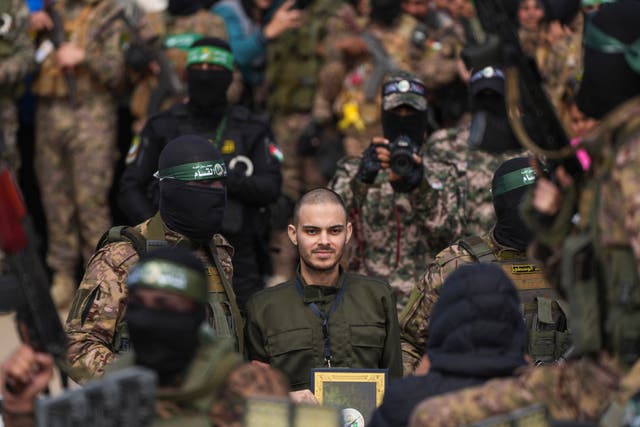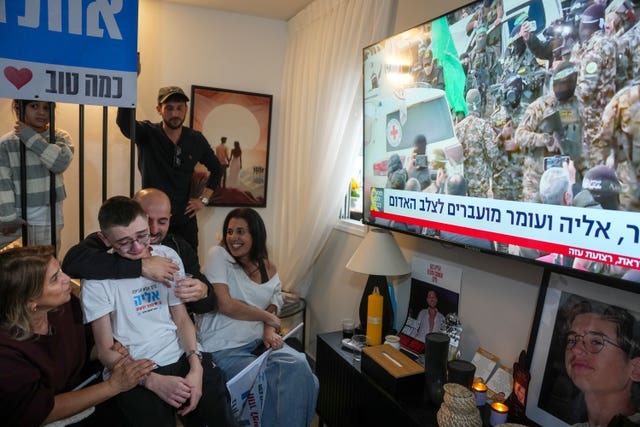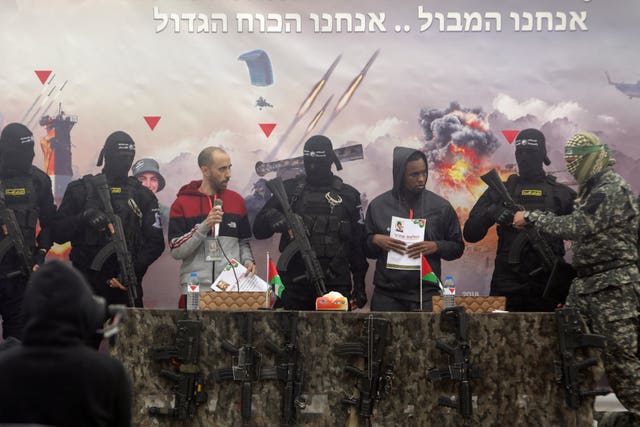Six hostages freed by Hamas in latest exchange
The captives were handed over in staged ceremonies that the Red Cross and Israel have condemned as cruel and disrespectful.

Hamas has released the last six living hostages under the first phase of its ceasefire with Israel with a week remaining, as growing questions over the next phase clouded the future of the fragile deal.
The six included three Israeli men seized from the Nova music festival and another taken while visiting family in southern Israel when Hamas-led militants stormed across the border on October 7 2023 in an attack that triggered Israel’s 16-month campaign in Gaza.
Five of the captives were handed over in staged ceremonies that the Red Cross and Israel have condemned as cruel and disrespectful, escorted by masked, armed Hamas fighters in front of hundreds of Palestinians.
Omer Wenkert, Omer Shem Tov and Eliya Cohen were posed alongside Hamas fighters. A beaming Shem Tov kissed two militants on the head and blew kisses to the crowd.
Watching the release, Mr Cohen’s family and friends in Israel chanted “Eliya! Eliya! Eliya!” and cheered.

Earlier on Saturday, two other hostages — Tal Shoham, 40, and Avera Mengistu, 38 — were freed.
Arriving in Israel, both were taken to medical centres for examination. Mr Mengistu, an Ethiopian-Israeli, entered Gaza on his own in 2014. His family told Israeli media he has struggled with mental health issues.
Later, Israel’s military said the final hostage, Hisham Al-Sayed, 36, was released. The Bedouin Israeli crossed on his own into Gaza in 2015. His family has told Israeli media he was previously diagnosed with schizophrenia.
Later on Saturday, more than 600 Palestinians imprisoned by Israel should be released. It is the largest one-day prisoner release in the ceasefire’s first phase.

The remains that Hamas transferred with her sons’ bodies on Thursday were determined to be those of an unidentified Palestinian woman.
Israeli Prime Minister Benjamin Netanyahu vowed revenge for “a cruel and malicious violation”, while Hamas suggested it was a mistake.
On Friday night, the small militant group believed to have been holding Ms Bibas and her sons — the Palestinian Mujahedeen Brigades — handed over a second body. Ms Bibas’ family said Israeli forensic authorities had confirmed the remains were hers.
“Now that it’s here, it brings no comfort, though we hope it marks the beginning of closure,” the family said.
Hamas on Saturday denied Israeli claims it was responsible for the deaths of the Bibas children, calling them lies aimed at justifying Israeli military action against civilians in Gaza.
The ceasefire deal has paused the deadliest and most devastating fighting ever between Israel and Hamas, but there are fears the war will resume after the first phase ends a week from now.
Hamas has said it will release four more bodies next week, completing the first phase of the ceasefire. After that, Hamas will be holding about 60 hostages, about half believed to be alive.

An Israeli official said Mr Netanyahu would meet security advisers on Saturday for consultations on the ceasefire’s future. The official said discussions would focus “on the goal of returning all our our hostages, alive and dead”.
Hamas has said it will not release the remaining captives without a lasting ceasefire and a full Israeli withdrawal. Mr Netanyahu, with the full backing of the Trump administration in the US, says he is committed to destroying Hamas’s military and governing capacities and returning all the hostages, goals widely seen as mutually exclusive.
Mr Cohen, Mr Shem Tov and Mr Wenkert, all in their 20s, were brought out wearing fake army uniforms, though they were not soldiers when they were abducted.
“This is an unforgettable moment, where all emotions are rapidly mixing together. Our Tal is with us,” Mr Shoham’s family said in a statement, calling for a deal to free all those still captive. “There is a window of opportunity; we must not miss it.”
Mr Shoham, who also holds Austrian citizenship, was visiting his family in Kibbutz Be’eri when Hamas militants stormed in during the October 7 attack. His wife, two young children and three other relatives were freed in a November 2023 exchange.
Mr Mengistu’s family and friends broke out into a Hebrew song, “Here is the Light,” as they saw him for the first time in more than a decade. “Do you remember me?” one brother asked as they embraced.
As concerns grew over the fate of hostages remaining in Gaza, the father of hostage Guy Gilboa-Dalal, Ilan Gilboa Dalal, told Israeli public broadcaster Kan that the family had received a sign of life — the first in eight months — from a hostage freed on Saturday who had been held with him.
Israel’s military offensive has killed more than 48,000 Palestinians, mostly women and children, according to Gaza’s Health Ministry, which does not distinguish between civilians and combatants. Israel says it has killed more than 17,000 fighters, without providing evidence.
The offensive destroyed vast areas of Gaza, reducing entire neighbourhoods to rubble. At its height, the war displaced 90% of Gaza’s population. Many have returned to their homes to find nothing left and no way of rebuilding.
The October 7 attack killed about 1,200 people, mostly civilians. Hundreds of Israeli soldiers have died in the war.





